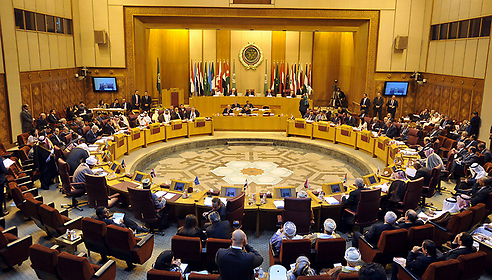Arab League declares Hezbollah terrorist group
Days after Gulf nations say Iran-backed organization is terrorist, Arab League follows suit, with only Lebanon and Iraq expressing 'reservations'.
Nearly all members of the pan-Arab body supported the decision, but not Lebanon and Iraq which expressed "reservations", the bloc said in a statement read out at a news conference by Bahraini diplomat Wahid Mubarak Sayar.
The announcement was made at a Cairo summit that raised a number of divisions between member states. On one side of the division is the Sunni axis led by Saudi Arabia, and on the other the Shi'ite-Alawite axis led by Iran, which funds Assad's regime in Syria as well as Hezbollah.
The decision caused much controversy among member states. The Saudi delegation stormed out of the meeting after Iraqi Foreign Minister Ibrahim al-Jaafari defended Hezbollah and the group's secretary general, Hassan Nasrallah.
The ambassador referred to Nasrallah as "an Arab hero who defends values and principles," adding that Hezbollah and Shi'ite militias in Iraq are a source of pride and respect among Arabs. "I only described Hezbollah as a resistant movement and rejected accusations against the Popular Mobilization Forces (a Shiite Iraqi group) and other resistant movements," al-Jaafari told the state daily Al-Ahram.
Lebanese Foreign Minister Gebran Bassil, born a Maronite Christian and known to be linked to Hezbollah, said that Lebanon is opposed to defining Hezbollah as a terrorist organization because it is contrary to the Arab Convention on the Suppression of terrorism, "in which Hezbollah is a central Lebanese component." Lebanon and Iraq abstained from the vote.
The league's decision also reflects deep regional divisions between Saudi Arabia and Iran. Saudi Arabia cut diplomatic relations with Iran earlier this year after protesters angry over the kingdom's execution of influential Shi'ite cleric Nimr al-Nimr set fire to the Saudi Embassy in Tehran and another diplomatic mission in Iran.
In addition to diplomatic pressures, Saudi Arabia has just finished a three-week long counter-terrorism drill dubbed "Northern Thunder" that included 20 participating countries, in what observers say was a show of force by the kingdom against its foes. It also sent a strategic message to Iran, and extremist Sunni groups like al-Qaida and the Islamic State group.
The kingdom has taken other punitive measures against Lebanon, including cutting $4 billion in aid to Lebanese security forces and urging its citizens to leave Lebanon -- a blow to the tiny nation's tourism industry -- in retaliation for Lebanon's siding with Iran amid the Sunni kingdom's spat with the Shiite power.
The GCC's and Arab League's decisions underline the steep price that Hezbollah's very public and bloody foray into Syria's civil war has had. Once lauded in the Arab world as a heroic resistance movement that stood up to Israel, Hezbollah has seen its popularity plummet among Sunni Muslims because of its staunch support for Assad.
In Lebanon, the main political divide pits a Sunni-led coalition against another led by the Shiite Hezbollah movement, which includes both political and military wings. The Mediterranean country has weathered a string of militant attacks in recent years linked to the war in neighboring Syria.
Lebanon's Foreign Ministry Gibran Bassil, speaking to reporters after the meeting in Cairo, said labeling Hezbollah as a terrorist organization goes against the Arab treaty for combating terrorism, which distinguishes between terrorism and resistance. He said Lebanon asked that the word "terrorist" be struck from the records of the meeting as if did not happen.
"Hezbollah is a Lebanese party that enjoys broad representation in the parliament and Cabinet ... Naturally we cannot accept that Hezbollah be described as a terrorist organization," he said.
There was no immediate comment from Hezbollah. On its main evening newscast, the group's Al-Manar TV reported on al-Jaafari's speech at the Arab League meeting without commenting on the league designation against Hezbollah.
Hours before the GCC decision, Hezbollah leader Hassan Nasrallah delivered a televised speech in which he harshly criticized Saudi Arabia for its punitive measures against Lebanon.
He repeated his accusations that the kingdom was directly responsible for some car bombings in Lebanon, Syria and Iraq, and denounced Saudi "massacres" in Yemen, where the kingdom is leading a U.S.-backed coalition of Arab states targeting Iran-supported Shiite rebels.
"Who gives Saudi Arabia the right to punish Lebanon and its army and Lebanese people living in Saudi Arabia and the Gulf just because Hezbollah is speaking out? We urge Riyadh to settle accounts with Hezbollah and not all the Lebanese," he said.
He also accused Saudi Arabia of seeking to cause strife between Sunnis and Shiites everywhere in the world and said its execution of al-Nimr in January came in that context.
Earlier this week, Israeli Arab parties Balad and Hadash, who are part of the Joint Arab List, slammed Gulf Cooperation Council decision to label Hezbollah as a terrorist organization. "Hezbollah fights against Israeli attacks on Lebanon, and this decision only serves the interests of Israel and the US," a Balad spokesperson said.
 |











